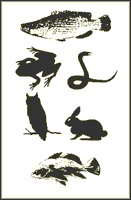Nebraska Cooperative Fish and Wildlife Research Unit

Nebraska Cooperative Fish and Wildlife Research Unit: Staff Publications
Date of this Version
2010
Abstract
Although the consequences of the homogenization of Earth’s flora and fauna are not well understood, experts agree that biological invasions pose hazards to rare species. As a result, there is a need for a systematic approach to assess risks from invasive species. The Relative Risk Model can be adapted to assess combinations of rare species, invasive species, and regions. It also can be applied to different taxonomic groups and at different spatial scales. This flexibility makes it a promising tool for invasive species risk assessment. We used the Relative Risk Model to quantify risks posed to endangered plant species by non-indigenous invasive plant species in Nebraska. We modeled the suitable habitats for eight invasive plant species, which we subsequently compared to documented occurrences of endangered plant species in a Geographic Information System. We combined this data with an assessment of the ecological impacts of each invasive species in a regional risk assessment framework to simultaneously calculate relative risk scores for invasive plant species, imperiled plant species, and subregions. We assessed uncertainty with Monte Carlo simulations. The results of this assessment are discrete values indicating the relative threat posed by invasive species to rare species, the relative risk posed to the rare species, and the relative risk in subregions. Results indicate that the invasive species Elaeagnus angustifolia and Rhamnus cathartica pose the greatest risks to endangered plants in Nebraska. The rare species Panax quinquefolius and the subregion Western Corn Belt Plains show the highest risk scores.


Comments
Published in Biological Conservation 143 (2010) 2070–2079